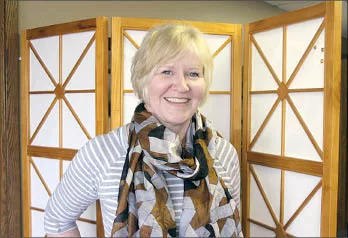Practice pinpoints different approach to treat infertility
Acupuncturist believes Eastern medicine helps treat hormone problems

According to the Centers for Disease Control and Prevention, about 10 percent of women of childbearing age in the United States have difficulty getting pregnant or staying pregnant. Hormonal changes and stress are two factors that can affect rates of pregnancy, which is where Coleen Smith, an acupuncturist in Spokane Valley, comes in.
Smith owns Point of Origin Clinical Acupuncture PLLC. The business, located at 12211 E. Broadway, focuses on hormone regulation, fertility issues, pain, and anxiety.
Smith says 60 percent of the patients she sees come in for women's health issues, such as fertility problems or hormone imbalances. The other 40 percent are typically there to receive help with pain or other ailments.
"You can't be an acupuncturist and not be dealing with pain all the time," Smith says.
She says with acupuncture and Eastern medicine, the belief is that there are 14 pathways in the body that are responsible for the movement of energy: six in the arms, six in the legs, and two that run down the center of the body.
For fertility purposes, Smith says she generally uses several points in the ear, as that's where the brain-ovary connection, or hypothalamic-pituitary-ovarian axis, is considered to be located. Through stimulation of those points over an extended period of time, she asserts, acupuncture can regulate the body's hormones, allowing ovulation, and hopefully pregnancy, to occur.
She says acupuncture typically is paired with an herbal supplement, and she usually recommends changes in a person's diet.
"You're helping the body settle down," Smith says. "You're making the body do what it's supposed to do naturally."
Smith says a woman's menstrual cycle can be an indicator of a fertility problem. Menstruation is supposed to be shorter and less painful than most women are used to, she contends. She says typically, a period should last between three and four days, and women should have minimal to no cramping.
"There are usually problems with the cycle that women don't even know about," Smith says.
She claims acupuncture can help with fertility in women who have hormonal imbalances or are diagnosed with certain disorders. Polycystic ovary syndrome, a disorder that leads to a hormone imbalance in women, can make pregnancy an issue as ovulation doesn't occur regularly. She speculates that acupuncture paired with in vitro fertilization, a more common approach to combating infertility, almost doubles the pregnancy rate for women with polycystic ovary syndrome.
Another problem she typically sees associated with infertility is endometriosis, a condition where endometrial cells from the uterine wall grow in other areas in the pelvis, such as the ovaries or bowel, which generally is accompanied by pain and irregular bleeding. She claims that with women who have endometriosis, acupuncture can be effective as it helps with the pain as well as infertility.
"It doesn't take away the difficult problems," Smith says. "But it does help with the symptoms of the problems."
Smith says using acupuncture while pregnant has been perceived by many as a dangerous practice because of its risk of inducing labor.
"A lot of acupuncturists won't treat pregnant women because of the risk of a miscarriage," she says.
Largely because of that, she says, all of her patients are required to be under the care of a physician while receiving acupuncture.
Smith opened her practice in December 2004 and says she moved to her current location in 2007. Point of Origin employs five people, including her. Smith is the only acupuncturist at the practice currently, but she says she plans to hire a second one in the next few months.
She says generally, she likes to see patients at the beginning, middle, and end of their menstrual cycle, or three times a month, but adds that doesn't always happen.
"It's expensive, and getting people three times a month is tough," she says.
Cost is an issue, with an acupuncture session typically ranging in price from $65 to $85 when paying out of pocket, but she also says that for many women, the emotional impact of going month to month and not getting pregnant can be draining.
"You have to pick yourself up every month," Smith says. "It's an emotional rollercoaster for women, and I'm on it with all of them."
Smith says the attitude within the medical community toward acupuncturists has changed since she opened her practice eight years ago. She says originally, many physicians would be hesitant about taking an Eastern medicine approach to fertility problems, but she now finds many are interested in learning more about what her practice entails.
Smith, who previously had worked as a nurse for 30 years, says that background affords her the ability to understand Western medicine and be able to communicate well with physicians and other medical professionals.
In general, she says most physicians she comes in contact with are receptive to what she does, but some don't have much faith in Eastern medicine.
"Not every physician is open," Smith says, adding that it's often difficult to explain that energy pathways exist and that they seem to work.
She says although she believes acupuncture can help with fertility, she encourages patients to consider in vitro fertilization, as sometimes it's the only way for some women to have a child. She says typically she will push for couples to try in vitro over acupuncture when pregnancy is time-sensitive because of age, or the couples want to have a child as soon as possible.
"If a baby's a must, I'm not going to guarantee that," Smith says.
Related Articles

_c.webp?t=1763626051)
_web.webp?t=1764835652)

